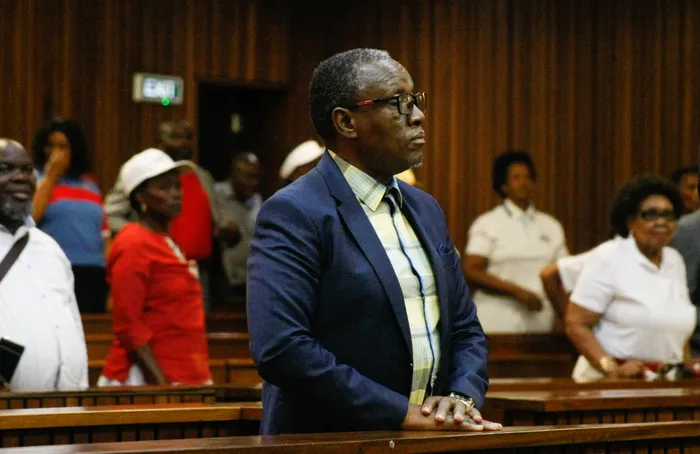Zondo sex trial: psychologist explains why some women do not report rape

Bishop Bafana Stephen Zondo in the Gauteng High Court, Pretoria. Picture: Jacques Naude / Independent Newspapers
As the prosecution’s case in the marathon sex trial of Rivers of Living Waters Church leader Bishop Bafana Stephen Zondo is drawing to a close, it called well-known forensic psychologist Professor Gerard Labuschagne to the witness stand.
He provided psychological insights into the delayed reporting of the complainants in this case of their allegations of rape.
The seven alleged victims have testified before the Gauteng High Court, Pretoria since the start of the trial towards the end of 2021. Most of them only came to the fore regarding their rape allegations years later.
The defence initially objected to Labuschagne giving this evidence, but Judge Papi Mosopa allowed his evidence.
Labuschagne said many sexual assault victims delay reporting the incident to the police and even more never report this. Research concluded in Gauteng earlier found that that only one in 25 women who had been raped reported this to the police.
According to him, victims typically go through four phases before deciding to report a rape to the police. First, the victim must see the incident as a crime and then decide on the seriousness of the incident.
She must then evaluate the consequences of reporting the crime, and then decide on a cause of action.
On why most women do not report a rape, Labuschagne said in the largest rape study concluded to date in South Africa, it showed that in all the cases opened in 2012, arrests were only made in 57% of them..About 63% of these cases were referred to prosecution and only 8.6% of the cases resulted in a guilty verdict.
“Therefore, a rape victim in South Africa has a 8.6% chance of finding justice after reporting their rape to the police,” he said.
Feelings of shame and guilt, as well as a lack of evidence are important barriers for reporting sexual violence. This, coupled with the fear of others knowing what happened to them, often also lead to women not reporting these crimes.
Labuschagne said some women also fail to recognise that what had happened to them was rape, as they do not know the legal definition of this crime. Others perceive their rape as a personal matter with which they would deal themselves.
Fear of their perpetrators also plays a big role in not reporting these cases. Many victims are afraid of being victimised twice. The humiliation of being questioned by the police and the prosecution also plays a role in not reporting these crimes, he said.
In dealing with sexual abuse by religious figures, Labuschagne said they gain intimate access to the lives of their flock. This includes their problems and weaknesses. He said priests and pastors and other heads of churches have a great positional and personal power to manipulate victims into believing they are consenting to sexual activity and that this is “blessed” by God.
“Clergy are not perceived in the same light as other professionals because of their ‘religious’ status and the nature of their work.” Labuschagne said clergy would often socialise with their flock outside of the Church. They thus have more power with which to abuse, as they have the “God factor”.
Labuschagne said looking at all this, it is thus understandable that the victims in this case case sometimes took many years before they reported the alleged rapes.
The State is, meanwhile, expected to call one more witness before it will close its case.
While it is not yet definitive that Zondo will take the witness stand in his own defence, it is expected that he will do so.
Armed with one of the top criminal advocates in the country, Piet Pistorius, the court was on numerous occasions told that Zondo will testify that his alleged victims are all out to either extort money from him or that they blacken his name so that they could start their own church.
The trial continues.
Pretoria News
Bishop Bafana Stephen Zondo’s marathon sex trial postponed yet again
Bishop Bafana Stephen Zondo’s alleged sex abuse victims accused of conspiring to incriminate him
Long road ahead in Bishop Stephen Zondo sexual abuse case
Bishop Bafana Stephen Zondo, legal team pinpoint more issues regarding translation of evidence during sex trial
Second alleged victim set to testify behind closed doors in sex trial of Bishop Stephen Zondo